

Survey Software - Crosstabs Software - Online and Paper Surveys. Limesurvey. Analyse This!!! - introduction - data analysis quiz. Do you know the difference between qualitative and quantitative data analysis?
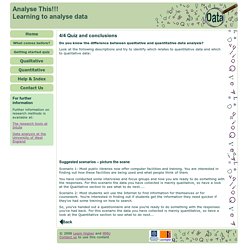
Look at the following descriptions and try to identify which relates to quantitative data and which to qualitative data: Suggested scenarios – picture the scene Scenario 1: Most public libraries now offer computer facilities and training. You are interested in finding out how these facilities are being used and what people think of them. You have conducted some interviews and focus groups and now you are ready to do something with the responses. Scenario 2: Most students will use the Internet to find information for themselves or for coursework.
So, you've handed out a questionnaire and now you're ready to do something with the responses you've had back. OERL: Instruments. OERL's instrument collection is designed to provide models for the development of new instruments.
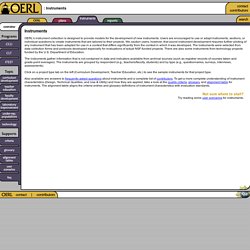
Users are encouraged to use or adapt instruments, sections, or individual questions to create instruments that are tailored to their projects. We caution users, however, that sound instrument development requires further piloting of any instrument that has been adapted for use in a context that differs significantly from the context in which it was developed. Mixed-Method Evaluations: Start. Directorate for Education and Human Resources Division of Research, Evaluation and Communication National Science Foundation The National Science Foundation (NSF) provides awards for research and education in the sciences and engineering.
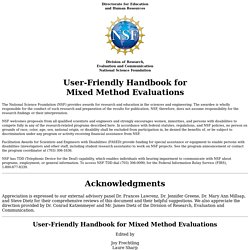
The awardee is wholly responsible for the conduct of such research and preparation of the results for publication. NSF, therefore, does not assume responsibility for the research findings or their interpretation. NSF welcomes proposals from all qualified scientists and engineers and strongly encourages women, minorities, and persons with disabilities to compete fully in any of the research-related programs described here.
Facilitation Awards for Scientists and Engineers with Disabilities (FASED) provide funding for special assistance or equipment to enable persons with disabilities (investigators and other staff, including student research assistants) to work on NSF projects. Appreciation is expressed to our external advisory panel Dr. Edited by. Program Evaluation Tutorial. Introduction STEP 1: Program Goal STEP 2: Program Objectives.
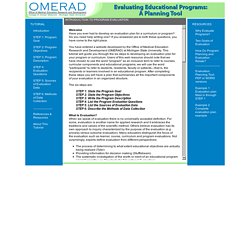
Evaluation. Revised UNODC Evaluation Policy published This document presents the United Nations Office on Drugs and Crime (UNODC) evaluation policy, as the set of principles and rules that guide the Organisation's decisions and actions when planning, conducting, disseminating and using evaluations.
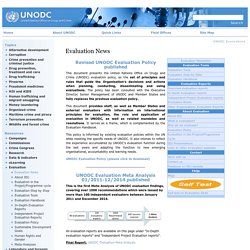
The policy has been consulted with the Executive Director, Senior Management of UNODC and Member States and fully replaces the previous evaluation policy. This document provides staff, as well as Member States and external evaluators with information on international principles for evaluation, the role and application of evaluation in UNODC, as well as related mandates and resolutions. It serves as a frame, which is complemented by the Evaluation Handbook. This policy is informed by existing evaluation policies within the UN while meeting the specific needs of UNODC. Evaluation Tools. Evaluation Tools and Instruments. Most evaluations require the use of a data collection tool—a survey or other data collection instrument.

Evaluators either need to adopt or adapt tools “off the shelf” or create new ones. Either method can pose challenges: Tools that have been developed for one evaluation may not prove suitable for another, at least not without careful modification. At the same time, creating new tools requires expertise in measurement and instrument design. How do you know if an off-the-shelf instrument is appropriate for your needs? Good question! What is the instrument measuring? Developing ELL Programs: Introduction. EvSys 0. Evaluation: What is it and why do it? Evaluation.
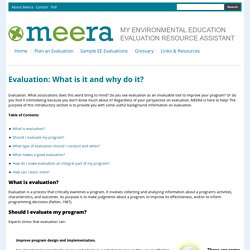
What associations does this word bring to mind? Do you see evaluation as an invaluable tool to improve your program? Or do you find it intimidating because you don't know much about it? Regardless of your perspective on evaluation, MEERA is here to help! The purpose of this introductory section is to provide you with some useful background information on evaluation. RR 11 15. Resources for Program Evaluation and Performance Monitoring. Program Evaluation Basics FHOP Planning Guide Chapter 4 “Developing Objectives, Performance Measures, and an Action Plan” (pdf)
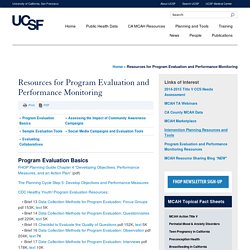
Selected Evaluation Terms. Evaluation terminology can be confusing to even the most seasoned of evaluators.
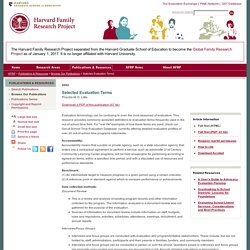
This resource provides commonly accepted definitions to evaluation terms frequently used in the out-of-school time field. For “real life” examples of how these terms are used, check our Out-of-School Time Evaluation Database, currently offering detailed evaluation profiles of over 20 out-of-school time programs nationwide. Accountability: Accountability means that a public or private agency, such as a state education agency, that enters into a contractual agreement to perform a service, such as administer 21st Century Community Learning Center programs, will be held answerable for performing according to agreed-on terms, within a specified time period, and with a stipulated use of resources and performance standards.
Benchmark: (1) An intermediate target to measure progress in a given period using a certain indicator. (2) A reference point or standard against which to compare performance or achievements. 1. Program Development and Evaluation – University of Wisconsin-Extension. This course provides a holistic approach to planning and evaluating education and outreach programs.
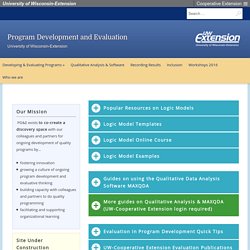
It helps program practitioners use and apply logic models – a framework and way of thinking to help us improve our work and be accountable for results. In this guide you will learn how to seamlessly import data from Qualtrics into MAXQDA. InformalScience : informal learning projects, research and evaluation. The Evaluation Center. Basic Guide to Program Evaluation (Including Many Additional Resources) © Copyright Carter McNamara, MBA, PhD, Authenticity Consulting, LLC. Home. Evaluation Tools — MEASURE Evaluation. MEASURE Evaluation developed these tools with the goal of maximizing program results through the systematic collection and analysis of information and evidence about health program performance and impact. How Do We Know if a Program Made a Difference? A Guide to Statistical Methods for Program Impact EvaluationThis manual provides an overview of core statistical and econometric methods for program impact evaluation and, more generally, causal modelling.
Evaluating Family Planning Programs with Adaptations for Reproductive HealthThis manual prepares readers to differentiate between the main types of program evaluation, program monitoring, and impact assessment. Evaluating HIV/AIDS Prevention Projects: A Manual for Nongovernmental OrganizationsThe purpose of this manual is to demystify the evaluation process, especially for staff who are not specialized in evaluation techniques. Survey Tools. Basics of Developing Questionnaires. © Copyright Carter McNamara, MBA, PhD, Authenticity Consulting, LLC. Adapted from the Field Guide to Consulting and Organizational Development. Whether developing questions for questionnaires or interviews or focus groups, there are certain guidelines that help to ensure that respondents provide information that is useful and can later be analyzed.
Sections of This Topic Include Types of Information Collected by Questions Two Types of Questions Key PreparationDirections to RespondentsContent of the QuestionsWording of the QuestionsOrder of the Questions Also see Related Library Topics There Is No Hope Of Doing Perfect Research Creating and Implementing Your Data Collection Plan Also See the Library's Blogs Related to Developing Questionnaires In addition to the articles on this current page, also see the following blogs that have posts related to Developing Questionnaires.
Library's Business Planning Blog Library's Building a Business Blog Library's Strategic Planning Blog 1. 2. Also see. Program Evaluation Standards Statements « Joint Committee on Standards for Educational Evaluation. In order to gain familiarity with the conceptual and practical foundations of these standards and their applications to extended cases, the JCSEE strongly encourages all evaluators and evaluation users to read the complete book, available for purchase at and referenced as follows: Yarbrough, D. B., Shulha, L. M., Hopson, R. K., & Caruthers, F. A. (2011). The standard names and statements, as reproduced below, are under copyright to the JCSEE and are approved as an American National Standard. Utility Standards. MandE tools methods approaches.
3ieimpact-3ie:International Initiative for Impact Evaluation. CDC Evaluation Resources - Program Evaluation - CDC. AEA - American Evaluation Association : Home. Evaluation Toolbox.